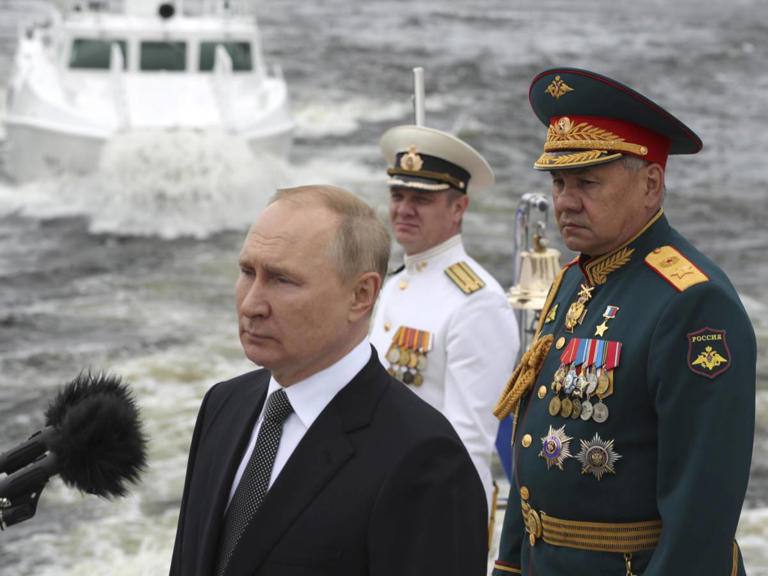Putin’s Last Arrow in the Water
Putin’s final move: He wants a naval base in the Mediterranean
Putin’s Last Arrow in the Water: According to Iran Gate, the idea of establishing a Russian naval base in Libya has been circulating in diplomatic corridors for years. Additionally, since 2016, Russia has been a close ally of General Haftar, ever since the strongman from Cyrenaica began taking full control of territory in the east of the country. Moscow, in exchange for economic and military aid, often requests the possibility of allowing part of its fleet to enter Benghazi or Tobruk. But now, the pressure on General Haftar will intensify. Some Wall Street Journal reporters have reported that American security sources have informed them of Washington’s concerns about the potential expansion of Russian influence in the Mediterranean Sea.
Moscow’s Pressure on Haftar
According to the Wall Street Journal, at least two ports have been identified by Moscow for docking Russian ships. The first is Benghazi, the largest and most important city in the Cyrenaica region, where Haftar himself is headquartered. The other is Tobruk, located a few kilometers from the Egyptian border and at the easternmost part of Libya’s coast. In both cases, these two ports have pre-existing infrastructure and are equipped with all the necessary facilities to accommodate a fleet.
Therefore, the Russians can, with minimal cost and allocation of financial resources, turn one of the two Libyan cities into Moscow’s second base in the Mediterranean Sea. As we know, Russia’s first base is in Tartus, a city and port in southwestern Syria, dating back to the 1960s, during the agreements between the Soviet Union and Hafez al-Assad, the father of Bashar al-Assad, the current president of Russia, according to which the port of Tartus was turned into a base for Russian ships in the Mediterranean Sea.
The Russian naval forces have leased a naval base in the port city of Tartus in the Mediterranean until 2042, and losing this base would turn the Mediterranean Sea into a sea under the control of the North Atlantic Treaty Organization. Therefore, the port city of Tartus holds strategic importance in Russia-Syria relations.
The coup in Libya is important for Russia’s ambitions in the Mediterranean and, more importantly, in Africa. For this reason, according to the Wall Street Journal, Putin has recently sent important envoys to Libya for direct talks with Haftar. Among them is Yunus-bek Yevkurov, the Deputy Minister of Defense. Reports indicate that Yevkurov has repeatedly traveled to Benghazi in recent weeks.
At the end of August, just days before the crash of the plane carrying Yevgeny Prigozhin, Yevkurov had asked General Haftar to free himself from Wagner’s presence and start withdrawing Wagner forces from Libya, essentially from the private company owned by Prigozhin, who was the Kremlin’s legal representative in eastern Libya.
But now, instead, this request is directly related to the possibility of establishing a naval base in one of the two important ports in the Cyrenaica region. Currently, General Haftar’s response and willingness to this request from Moscow are unclear and ambiguous, especially since Haftar is currently dealing with the disaster caused by Hurricane Daniel in the areas under his control.
Why Russia Wants to Establish a Base in Libya
Moscow currently has significant interests in the region stretching from North Africa to the Sahel. This is evidenced by the fact that the Wagner Group has long been active not only in Libya but also in Sahel countries like Mali and the Central African Republic. Now, the Kremlin is attempting to replace Prigozhin’s company with other private companies, aiming to continue past activities and remain in the sandy hills of the desert, thereby investing in Africa.
A naval base in Libya will undoubtedly facilitate Vladimir Putin’s plans. Firstly, because it will definitively make Russia one of the main players in North African countries, where even today regional powers are trying to carve out their own spaces. Secondly, because it will specifically give Moscow an important foothold in the African territory.
Then there’s another reason not to be underestimated, which relates to the long-distance tug-of-war with the United States and NATO. It must be acknowledged that placing a naval base just a few kilometers from Greece and Italy will certainly be considered a disrespect to the Atlantic Alliance.
Washington’s Response
The United States is well aware of Russia’s actions in Libya, not just now but has been monitoring and observing Russia’s movements in this region for several months. In fact, it’s no coincidence that Washington has suddenly returned to addressing the Libya issue after years of absence. In recent months, the White House sent William Burns, the CIA director, to Tripoli and Benghazi, where he met with the Prime Minister of the government based in Tripoli, Abdul Hamid Dbeibeh, and General Haftar. In the coming days, other envoys will also go to Libya and hold meetings in the eastern and western parts of the country.
The United States’ idea is clear: only by reuniting Libya can the definite slide of Haftar into Russia’s hands be prevented. Therefore, the U.S. diplomatic work and its goal are very clear and obvious: to facilitate dialogue between the parties and create the right conditions for a national unity government. In turn, Washington can leverage the fact that General Haftar holds U.S. citizenship to persuade him not to yield to Moscow’s demands.
English
View this article in English

